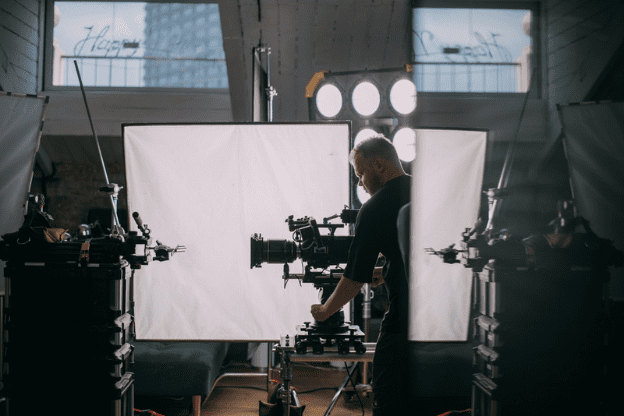
| Introduction |
|---|
| The Importance of Memorizing Lines in Acting and Filmmaking |
| RSFI Institute: Elevate Your Acting and Filmmaking Skills |
| Why Choose RSFI Institute for Filmmaking Courses? |
| Best Practices for Memorizing Lines |
| Effective Techniques for Line Memorization in Filmmaking |
| Contextual Understanding |
| Script Analysis |
| Active Listening |
| Improvisation Practice |
| Consistent Rehearsal |
| FAQs |
| Conclusion |

In acting and filmmaking, knowing your lines inside out is essential. It allows actors to focus on their performance, emotions, and interactions with other characters rather than struggling to recall the next word. This seamless delivery is crucial for creating a believable and engaging portrayal, whether on stage or in a film. Moreover, directors and fellow actors appreciate a professional who comes prepared, as it keeps the production process smooth and efficient.
Before you even begin to memorize your lines, it's vital to understand the script thoroughly. Comprehend the storyline, your character's motivations, relationships, and the context of each scene. This understanding will make the memorization process more intuitive, as you'll be able to link your lines to the emotions and actions of your character.
Memorizing a long script can be daunting but breaking it down into smaller sections makes the task more manageable. Focus on memorizing one scene, or even one paragraph, at a time. This approach prevents you from feeling overwhelmed and allows for more focused and effective memorization.
Read About: Meisner Technique vs Method Acting: Which One Suits Your Acting Style?
Repetition is one of the most effective techniques for memorizing lines. Read your lines aloud multiple times until they start to stick. Repetition helps reinforce your memory, making it easier to recall the lines when needed. Some actors find it helpful to write their lines down as well, as the act of writing can further embed the words in your memory.
Incorporate memory techniques such as mnemonics, visualization, and association to aid in memorization. For instance, create a mental image or a story that links your lines together. These techniques can make memorizing lines more fun and engaging, helping you retain information more effectively.

Practicing with a partner can significantly enhance your memorization process. A fellow actor or a friend can read other characters' lines, providing you with the cues you need to respond. This practice not only helps with memorization but also improves your timing and interaction with other characters.
Recording your lines and listening to them can be incredibly beneficial. Hearing your lines repeatedly can help reinforce your memory. You can listen to your recordings while commuting, exercising, or doing household chores, turning idle time into productive memorization sessions.
Incorporating physical activity while memorizing lines can boost your retention. Try walking around, gesturing, or even acting out scenes as you memorize. Physical movement can help anchor your lines in your memory, making them easier to recall later.
Don't underestimate the power of breaks and rest in the memorization process. Taking short breaks between memorization sessions can prevent mental fatigue and keep your mind fresh. Additionally, getting enough sleep is crucial, as your brain consolidates memories during sleep, helping you retain the lines you’ve learned.

Maintaining a relaxed and positive mindset is essential for effective memorization. Stress and anxiety can hinder your ability to recall information. Practice relaxation techniques such as deep breathing, meditation, or mindfulness to stay calm and focused. Believe in your ability to memorize and deliver your lines successfully.
Technology can be a great ally in memorizing lines. There are numerous apps designed to help actors memorize scripts. These apps often include features like line highlighting, recording, and playback, making it easier to practice and perfect your lines.

For those looking to enhance their acting and filmmaking skills, the RSFI Institute offers comprehensive courses in acting, filmmaking, and film production. Known for being one of the best filmmaking schools, the RSFI Institute provides hands-on training, industry insights, and the opportunity to work with seasoned professionals, ensuring you are well-prepared for a successful career in the entertainment industry.
Expert Faculty: The RSFI Institute boasts a faculty of experienced professionals who have worked in various aspects of the filmmaking industry. Their insights and guidance are invaluable for students looking to understand the nuances of filmmaking.
Expert Faculty: The RSFI Institute boasts a faculty of experienced professionals who have worked in various aspects of the filmmaking industry. Their insights and guidance are invaluable for students looking to understand the nuances of filmmaking.
Comprehensive Curriculum: The curriculum at RSFI Institute covers everything from acting techniques to film production courses. Students receive a well-rounded education that prepares them for all facets of industry.
Industry Connections: The RSFI Institute has strong connections within the filmmaking industry, providing students with networking opportunities that can lead to internships and job placements after graduation.
State-of-the-Art Facilities: The institute is equipped with modern facilities, including sound stages, editing suites, and high-quality filming equipment. Students have the chance to work with the latest technology, gaining practical experience that is crucial for their careers.

Creating a consistent routine for memorizing lines can help establish a rhythm that makes the process more efficient. Set aside specific times each day dedicated to memorization. Whether it's early in the morning or late at night, having a routine ensures that you regularly practice and reinforce your lines.
Connecting emotionally with your lines can make them easier to remember. Understand your character's feelings and motivations in each scene, and let those emotions drive your memorization process. When you feel the lines deeply, they become a part of you, making them easier to recall.
Engage multiple senses in the memorization process. Visualize the scenes, listen to the recordings, speak the lines out loud, and even move around as you practice. The more senses you involve, the stronger your memory retention will be.
Associate your lines with physical actions, emotions, or specific locations. For instance, if a scene involves picking up an object, practice the lines while physically doing that action. These associations create additional memory cues that can help trigger your recall during performance.
Regular review sessions are crucial for long-term retention. Even after you feel confident with your lines, continue to review them periodically. This practice reinforces your memory and ensures you won't forget your lines under pressure.

Understanding the context of your lines within the larger narrative of the film is crucial. Knowing what happens before and after your lines helps you understand your character's trajectory and the importance of your dialogue. This contextual understanding makes the lines more meaningful and easier to remember.
Perform a thorough script analysis, breaking down each scene and understanding its significance. Identify key moments, turning points, and emotional beats. This analysis provides a framework for your lines, helping you remember them within the context of the story.
Active listening is essential for memorizing lines in a film setting. Pay attention to your fellow actors' lines, as they often serve as cues for your own dialogue. Being a good listener ensures you respond naturally and fluidly during scenes, creating a more authentic performance.
Incorporate improvisation into your practice sessions. This technique allows you to explore different ways of delivering your lines and helps you become more comfortable with the dialogue. Improvisation can also reveal new insights into your character and the scene.
Rehearsal is key to memorizing lines effectively. Regularly rehearse with your scene partners, director, or even alone. Consistent rehearsal builds muscle memory and helps you internalize your lines, making them second nature during performance.
Effective techniques include repetition, breaking the script into smaller sections, using memory aids like mnemonics, practicing with a partner, and recording and listening to your lines. Incorporating physical activity and staying relaxed also enhances memorization.
To reduce stress, create a consistent routine, take breaks, get enough rest, and maintain a positive mindset. Using relaxation techniques such as deep breathing and visualization can also help keep you calm and focused.
Understanding the context helps you grasp the storyline, your character's motivations, and the significance of your lines within the narrative. This comprehension makes memorization more intuitive and ensures a more authentic performance.
Yes, practicing with a partner provides cues, enhances timing, and improves interaction with other characters. It simulates real performance conditions, making memorization more effective.
Technology offers various tools like script apps and recording devices that aid in memorization. These tools provide convenient ways to practice, review, and reinforce your lines, making the process more efficient.
The RSFI Institute offers comprehensive acting and filmmaking courses, expert faculty, industry connections, and state-of-the-art facilities. Their programs are designed to provide hands-on training and prepare students for successful careers in the entertainment industry.
Memorizing lines quickly and effectively is an essential skill for anyone involved in acting and filmmaking. By understanding the script, using repetition, practicing with a partner, and utilizing modern technology, actors can enhance their memorization abilities. The RSFI Institute, renowned for being one of the best filmmaking schools, offers acting and filmmaking courses that provide the training and skills necessary to succeed in the competitive world of film production. By following these tips and taking advantage of the resources available, actors can confidently deliver their lines and bring their characters to life on screen.